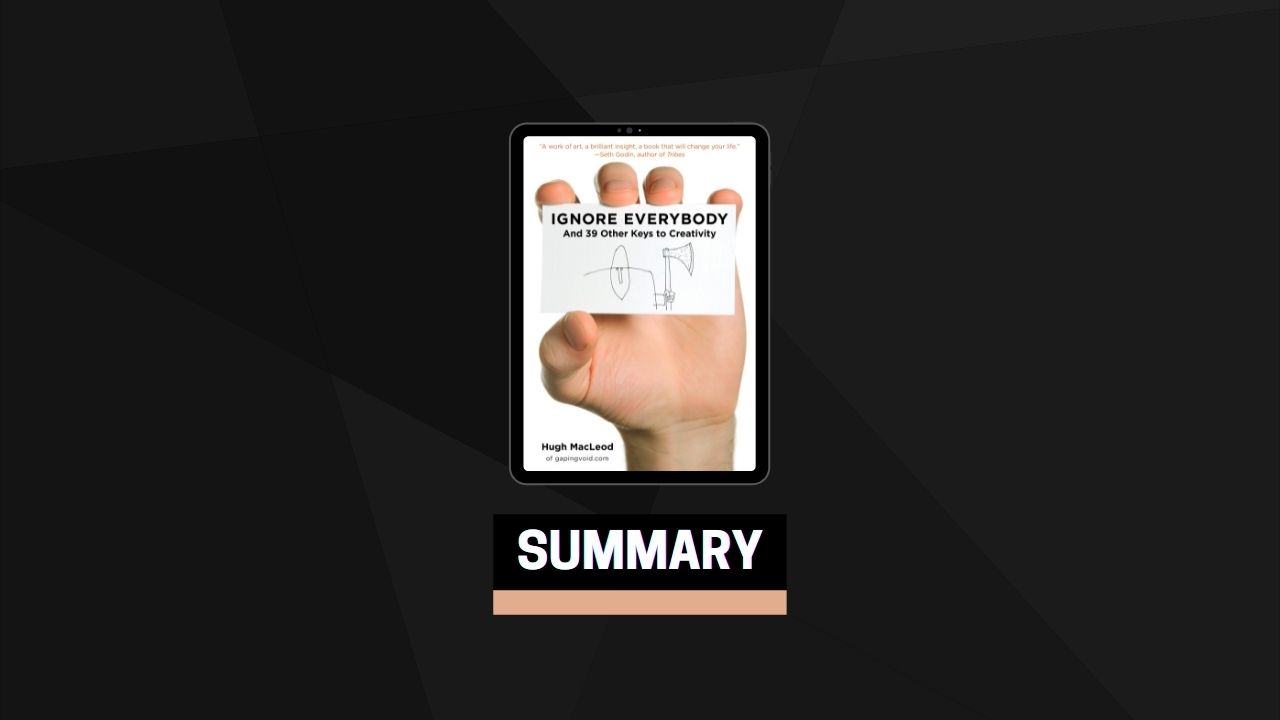#1 Ignore everybody.
You don’t know if your idea is any good the moment it’s created. Neither does anyone else. The most you can hope for is a strong gut feeling that it is. And trusting your feelings is not as easy as the optimists say it is. There’s a reason why feelings scare us—because what they tell us and what the rest of the world tells us are often two different things.
And asking close friends never works quite as well as you hope, either. It’s not that they deliberately want to be unhelpful. It’s just that they don’t know your world one millionth as well as you know your world, no matter how hard they try, no matter how hard you try to explain.
Plus a big idea will change you. Your friends may love you, but they may not want you to change. If you change, then their dynamic with you also changes. They might prefer things the way they are, that’s how they love you—the way you are, not the way you may become.
#2 The idea doesn’t have to be big. It just has to be yours.
The more the idea is yours alone, the more freedom you have to do something really amazing. The more amazing, the more people will click with your idea. The more people click with your idea, the more this little thing of yours will snowball into a big thing.
#3 Put the hours in.
If somebody in your industry is more successful than you, it’s probably because he works harder at it than you do. Sure, maybe he’s more inherently talented, more adept at networking, but I don’t consider that an excuse. Over time, that advantage counts for less and less. Which is why the world is full of highly talented, network-savvy, failed mediocrities. So yeah, success means you’ve got a long road ahead of you.
#4 Good ideas have lonely childhoods.
And of course, once your idea starts outgrowing its “lonely childhood,” you might have a new problem to contend with.
The author refers to it as the “I want to be part of something! Oh, wait, no I don’t” syndrome.
Again, this is to be expected. Good ideas don’t exist in a vacuum. Good ideas exist in a social context. And not everybody has the same agenda as you.
Good ideas can have lonely young adulthoods, too.
#5 If your business plan depends on suddenly being “discovered” by some big …
Thanks to the Internet, you can now build your own thing without having somebody else “discovering” you first. Which means when the big boys come along offering you deals, you’ll be in a much better position to get exactly what you want from the equation. Big offers are a good thing, but personal sovereignty matters a whole lot more over the long run.
#6 You are responsible for your own experience.
Every creative person is looking for “THE Big Idea.” You know, the one that is going to catapult him or her out of the murky depths of obscurity and onto the highest planes of cultural rock stardom.
So naturally you ask yourself, if and when you finally come up with The Big Idea, after years of toil, struggle, and doubt, how do you know whether or not it is “The One”?
Answer: You don’t.
All you get is this rather quiet, kvetchy voice inside you that seems to say, “This is totally stupid. This is utterly moronic. This is a complete waste of time. I’m going to do it anyway.”
And you go do it anyway.
#7 Everyone is born creative; everyone is given a box of crayons in kindergarten.
You don’t know if you’re any good or not, but you think you could be. And the idea terrifies you. The problem is, even if you are good, you know nothing about this kind of business. You don’t know any publishers or agents or venture capitalists or any of these fancy-shmancy kind of folk. You have a friend who’s got a cousin in California who’s into this kind of stuff, but you haven’t talked to your friend for over two years . .
You’ve always worked hard your whole life, you’ll be damned if you’ll put all that effort into something if there ain’t no pot of gold at the end of this dumb-ass rainbow . . .
Heh. That’s not your wee voice asking for the crayons back. That’s your other voice, your adult voice, your boring and tedious voice trying to find a way to get the wee crayon voice to shut the hell up.
Go ahead and make something. Make something really special. Make something amazing that will really blow the mind of anybody who sees it.
If you try to make something just to fit your uninformed view of some hypothetical market, you will fail. If you make something special and powerful and honest and true, you will succeed.
#8 Keep your day job.
The creative person basically has two kinds of jobs: One is the sexy, creative kind. Second is the kind that pays the bills. Sometimes the task at hand covers both bases, but not often. This tense duality will always play center stage. It will never be transcended.
#9 Companies that squelch creativity can no longer compete with companies that …
Creating an economically viable entity where lack of original thought is handsomely rewarded creates a rich, fertile environment for parasites to breed. And that’s exactly what’s been happening. So now we have millions upon millions of human tapeworms thriving in the Western world, making love to their PowerPoint presentations, feasting on the creativity of others.
What happens to an ecology when the parasite level reaches critical mass?
The ecology dies.
If you’re creative, if you can think independently, if you can articulate passion, if you can override the fear of being wrong, then your company needs you now more than it ever did. And now your company can no longer afford to pretend that isn’t the case.
#10 Everybody has their own private Mount Everest they were put on this earth …
Let’s say you never climb it. Do you have a problem with that? Can you just say to yourself, “Never mind, I never really wanted it anyway,” and take up stamp collecting instead?
Well, you could try. But I wouldn’t believe you. I think it’s not OK for you never to try to climb it. And I think you agree with me. Otherwise you wouldn’t have read this far.
Rock on.
30 More Tips To Be Creative
- The more talented somebody is, the less they need the props.
- Don’t try to stand out from the crowd; avoid crowds altogether.
- If you accept the pain, it cannot hurt you.
- Never compare your inside with somebody else’s outside.
- Dying young is overrated.
- The most important thing a creative person can learn professionally is …
- The world is changing.
- Merit can be bought. Passion can’t.
- Avoid the Watercooler Gang.
- Sing in your own voice.
- The choice of media is irrelevant.
- Selling out is harder than it looks.
- Nobody cares. Do it for yourself.
- Worrying about “Commercial vs. Artistic” is a complete waste of time.
- Don’t worry about finding inspiration. It comes eventually.
- You have to find your own shtick.
- Write from the heart.
- The best way to get approval is not to need it.
- Power is never given. Power is taken.
- Whatever choice you make, the Devil gets his due eventually.
- The hardest part of being creative is getting used to it.
- Remain frugal.
- Allow your work to age with you.
- Being Poor Sucks.
- Beware of turning hobbies into jobs.
- Savor obscurity while it lasts.
- Start blogging.
- Meaning scales, people don’t.
- When your dreams become reality, they are no longer your dreams.
- None of this is rocket science.
If I had to condense this entire book into a line or two, it would read something like, “Work hard. Keep at it. Live simply and quietly. Remain humble. Stay positive. Create your own luck. Be nice. Be polite.”


